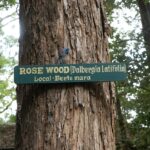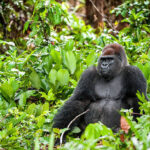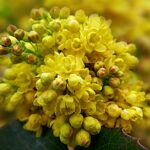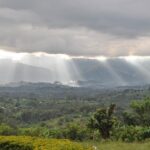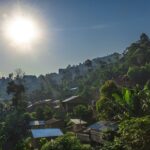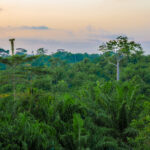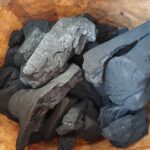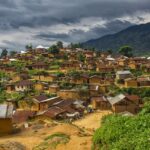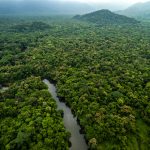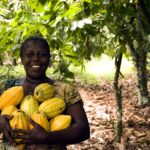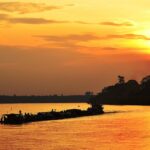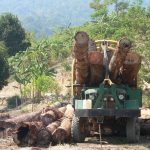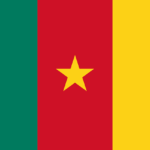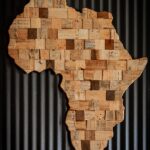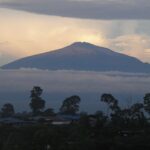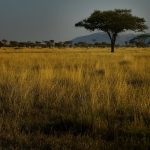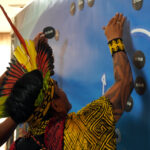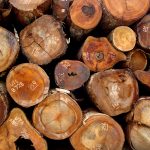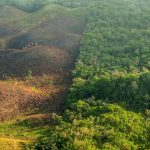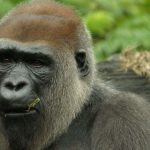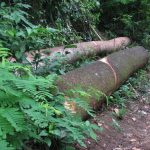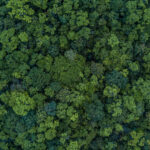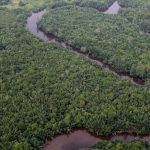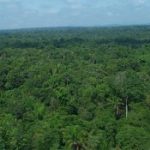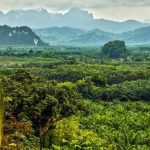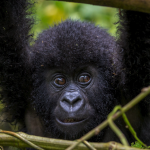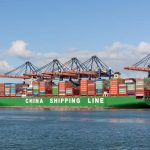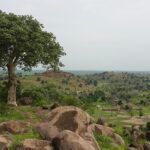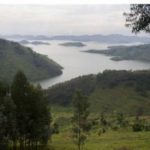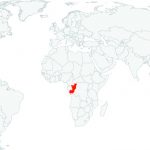
Deforestation rates have almost doubled in the last decade (2010-2020) compared with 2000-2010. The DRC reported a loss of over one million hectares annually between 2010 and 2020, the third highest in the world behind China and Brazil. Much of this recorded loss has taken place in the last few years, with the University of Maryland reporting that 2017 was a record year for tree cover loss in the DRC. Deforestation is reportedly driven by a range of factors, with studies pointing to slash-and-burn agriculture and, increasingly, artisanal logging which is often illegal, as well as charcoal production. Industrial forest concessions only cover roughly 7 percent of the DRC’s forests with the World Resources Institute suggesting that just 10 percent of the 2017 forest loss occurred inside logging concessions.
- Illegal logging is increasing and driving deforestation in the Democratic Republic of the Congo (DRC).
- There are well-publicized governance challenges, subnational conflict, and reports of corruption in the DRC’s timber sector.
- There is a high risk that timber has been logged without the proper permits or that the permits were corruptly obtained.
- There remains a risk of unsustainable and illegal trade in Convention on International Trade in Endangered Species of Wild Fauna and Flora (CITES) listed species.
- Forest laws are not well-enforced.
- Non-mandated independent monitoring and watchdog groups are facing intimidation.
- Tax evasion is widespread.
- Direct exports to U.S. and European Union (EU) markets have fallen significantly, while exports to Vietnam and India have rapidly risen.
Read more by downloading the DRC Timber Legality Risk Dashboard here.
Rosewood accounts for nearly a third of the value of illegal wildlife trade seizures worldwide, and illegal harvesting of the trees has continued in spite of efforts to regulate its trade and harvest.
Researchers say that new and existing technologies such as AI-equipped drones could help detect the illegal logging of rosewood trees inside inaccessible and remote forests, allowing forest officials to intervene in real time. AI could also help predict the risk of future rosewood logging activities, helping forest officials focus their monitoring efforts. In addition, the nonprofit TRAFFIC is currently testing AI-based image recognition tools for species identification, while other scientists are working on techniques that identify rosewood species based on DNA samples.
The Congo Basin’s rare redwood (Ribuyo) and whitewood (Muvule) are under threat of extinction as Asia’s demand for luxury furniture remains high. Burundian newspaper Ibihe highlights large-scale timber smuggling from the Democratic Republic of the Congo (DRC) into Burundi and then onward to China via East African transit routes.
Redwood and whitewood are illegally harvested from the outskirts of Kahuzi-Biega National Park (PNKB), and from around the villages of Kalonge, Kamakombe, Bisiru, Kabulungu, Bugore and Lwama-Kivu in the protected areas of Ngandja and Itombwe Nature Reserve in the DRC.
Smugglers transport the wood from the Mushimbaki port at Baraka town on Lake Tanganyika, to Kalundu’s port near Uvira. From there, it’s smuggled through Ubwari Island to the port of Rumonge in Burundi, loaded onto trucks, and transported to Bujumbura.
Burundian investigative journalist Arthur Bizimana says traditional leaders give informal permission for timber harvesting on community lands, bypassing legal procedures. Park rangers accept bribes from illegal loggers to fell trees in national parks.
Brokers serve as the middlemen between illegal loggers and buyers in regional and international markets, organising the transportation of the illegally harvested timber. Armed groups tax the illegal trade and protect transporters through conflict zones.
An Environmental Investigation Agency report highlights the role of Chinese logging companies in promoting illegal logging in the DRC through forged permits. The report names two companies in particular, Wan Peng and Booming Green.
Tiong was the executive chairman of Rimbunan Hijau and the honorary chairman of Sin Chew Daily. Tiong and his family were on the Forbes list of Malaysia’s 50 Richest in April this year, placing 25th with an estimated net worth of US$820mil (RM3.4bil).
Other than timber exports and timber processing, his business expanded to media and publishing, agriculture (oil palm plantations and mills), oil and gas, mining, aquaculture, reforestation, finance, information technology, trading and property development. Today, the group is a diversified multinational with operations in Malaysia and across numerous countries, including Singapore, Indonesia, Cambodia, Hong Kong, Japan, South Korea, Papua New Guinea, Australia, Russia, the Congo, Equatorial Guinea, Gabon, Guyana, Canada, and the United States.
Government launches licensing round for 52 fossil fuel blocks, potentially undermining a flagship conservation initiative and affecting an estimated 39 million people.
The blocks opened for auction cover 124m hectares (306m acres) of land and inland waters described by experts as the “world’s worst place to prospect for oil” because they hold vast amounts of carbon and are home to some of the planet’s most precious wildlife habitats, including endangered lowland gorillas and bonobo.
In East Africa, a lack of border controls and widespread fraud facilitate the illegal timber trade. In the outdoor workshops, carpenters make stylish, solid mahogany furniture for wealthy customers. It is termite-resistant and built to last. However, behind this polished furniture and finely carved chairs lies a significant problem: opaque supply chains, uncontrolled borders, and logging operations stretching over a thousand kilometers into the center of the Democratic Republic of the Congo (DRC).
Anthony Muchui, a furniture store manager on Ngong Road since 2018, explains:Almost all the mahogany here comes from the Congo. It’s durable, impact-resistant, and has a stunning finish. Muchui estimates that his business uses around 30 tons of mahogany every month or two.
The timber arrives via agents who obtain permits from the DR Congolese and Ugandan authorities. Once in Kenya, truck drivers present documents from the DRC, tax forms from the Kenya Revenue Authority (KRA), and their identity cards. However, Muchui admits that not all the timber is “legal.”
In eastern DRC, logging mainly occurs in the provinces of Ituri (in the east, close to the border with Uganda), Bas-Uélé (in the north), and Tshopo (mid-northeast). These border regions have become logging operation gold mines in North Kivu and Ituri. Justin Malekani, a former logging operations manager turned carpenter in Butembo, explains: Local leaders sell access to trees. We pay the ‘Kingiyapoli’ (a type of access fee), typically involving a goat and some beer. We hire forest people as guides as they know the forest best.
Although legal operations require permits from the National Forestry Fund (FFN) and demarcation from the environment service, many sidestep these requirements. An anonymous source said:Fraud makes things too easy. If we register our companies, we’ll go bust due to bureaucracy. Going it alone is better.
Timber exporters go through complicated processes at the Kasindi border post between the DRC and Uganda. Before the trucks are even loaded, they must pay the Congolese Control Office (OCC), the National Intelligence Agency (ANR), and other agencies between USD 1,000 and USD 1,200.
At the Busia border post in Kenya, KRA and Kenya Forest Service (KFS) officials review the certificates of origin and transit documentation. However, some shipments bypass official controls.
Experts argue that protecting the Congo Basin requires a regional solution. With forests already depleted in Kenya, Uganda, and Tanzania, demand has shifted to the DRC.
The Republic of Congo had been protecting about half of its dense rainforests via the Reducing Emissions from Deforestation and forest Degradation (REDD+) framework. In exchange, the country is supposed to receive payments from the World Bank. But Mongabay Africa staff writer Elodie Toto’s recent investigation revealed the nation has also granted nearly 80 gold mining and exploration permits in areas covered by the project, driving deforestation and negatively impacting local populations.
The Republic of Congo has one of the lowest deforestation rates in the world, but “uncontrolled gold mining” in recent years could harm the country’s biodiversity, especially in the Sangha region, Mongabay’s Elodie Toto reported in a video published in February.
In 2020, the Republic of Congo government set up the Sangha-Likouala REDD+ program, meant to reduce deforestation and forest degradation and carbon emissions. The government reported that the program had sequestered more than 1.5 million metric tons of carbon by 2020. If the claims are verified, the World Bank will buy the resulting carbon credits for $8.3 million, Toto writes in an article about the investigation. However, since the start of the REDD+ program, Mining Minister Pierre Oba has issued 79 exploration and semi-industrial gold mining permits in Sangha, Mongabay learned over the course of an eight-month investigation. About 14% of the territory has already been allocated to gold mining.
Supported by the French Foreign Affairs Ministry through the local embassies, the two-year project aims to create a robust network of environmental defenders and an observatory to monitor and combat illegal activities harming the region’s rich biodiversity and indigenous communities.
Ongoing conflict, particularly around Virunga, Kahuzi-Biega and Maiko national parks, has made enforcement agencies already perilous work even more dangerous. The resurgence of the M23 rebel group and other armed factions has led to increasing threats, forcing conservationists into a desperate fight to protect endangered wildlife while struggling with dwindling support and mounting insecurity. With vast areas rendered inaccessible, poaching and illegal logging have surged.
The Democratic Republic of Congo’s parliament has passed legislation that will establish “an area covering 540,000 km² (the size of France), within which 108,000 km² (the size of Iceland) is primary forest” will be protected through partnerships with communities in ways that tie conservation with restoration that allows for green economic development. The area will be known as the Kivu-Kinshasa Green Corridor and will be supported by a public-private partnership led by the 1t.org platform
A legal case in the Democratic Republic of Congo highlights the danger faced by environmental defenders in the country.
Forest defenders in the Democratic Republic of Congo (DRC) have stepped up their battle against a jail sentence and a hefty fine given to a colleague, in a case they say has been corrupted by illegal loggers. A court in Kasongo, in the country’s eastern province of Maniema, sentenced Yahya Mirambo Bin Lubangi to six months in jail and a fine equivalent to around US$4,000 in November. The case was bought by a logger, who claimed that Lubangi issued death threats and damaged property during his campaigning, allegations Lubangi denies.
Suspended
Countries in the Central African Economic and Monetary Community (CEMAC) zone continue to endure challenges from low growth, high and persistent poverty, and a strong dependence on volatile oil markets. Well-designed fiscal policies, complemented by increased timber processing, can help build a sustainable timber industry while preserving the vast natural wealth of the Congo Basin.
The World Bank report notes that due to illegal logging, a large informal logging sector, revenue losses from indiscriminate use of tax incentives, and corruption, a significant portion of potential forestry revenue is lost. As a result, revenue from forestry represented a negligible 1% of total tax revenue and 0.2% of GDP in the Congo Basin countries in 2022.
Countries in the Central African Economic and Monetary Community (CEMAC) zone continue to endure challenges from low growth, high and persistent poverty, and a strong dependence on volatile oil markets. Well-designed fiscal policies, complemented by increased timber processing, can help build a sustainable timber industry while preserving the vast natural wealth of the Congo Basin.
The World Bank report notes that due to illegal logging, a large informal logging sector, revenue losses from indiscriminate use of tax incentives, and corruption, a significant portion of potential forestry revenue is lost. As a result, revenue from forestry represented a negligible 1% of total tax revenue and 0.2% of GDP in the Congo Basin countries in 2022.
The DRC has filed criminal complaints against Apple subsidiaries in Belgium and France, accusing them of using conflict minerals in their supply chain.
More than 90% of the population in the Democratic Republic of Congo rely on charcoal for their energy needs, driving the pervasive logging of forests across the country. One of the affected areas is Virunga National Park and its surroundings, the source of the wood for 92% of the charcoal used in North Kivu province.
Activists and experts attribute the problem to the inaccessibility and high cost of grid electricity, as well as the fact that long-running armed conflict has led to 2.7 million people, out of North Kivu’s official population of 6.6 million, becoming internally displaced. Some initiatives underway aim to tackle the problem, including development of solar and hydroelectric power, and commercial tree plantations to produce charcoal, but none of these are at the scale required yet to make a meaningful impact.
The Rainforest Foundation UK (RFUK) released a report on data it collected on human rights complaints procedures at 24 protected areas in four Congo Basin countries. The data showed that only around a third had active grievance and redress mechanisms (GRMs), and that most suffered from shortcomings related to financing, participation, design and transparency.
Of parks with procedures for community members to make complaints about human rights abuses, fewer than half kept a public register of those complaints or their outcomes.
Researchers say carbon credit projects involving private companies, NGOs and logging companies have proliferated in the Democratic Republic of Congo. They’ve documented projects covering more than a quarter of the DRC’s nearly 200 million hectares (494 million acres) of forest.
Preliminary findings suggest that the DRC lacks the governmental guardrails to ensure these projects are helping to avoid deforestation and that they are not harming communities.
A multinational law enforcement operation codenamed ‘Operation Jungle Shield’, coordinated by the International Initiative of Law Enforcement for Climate (I2LEC), has uncovered extensive environmental crimes across the Congo Basin. The operation hit at organized crime groups, seizing 2,111kg of ivory and 34 kg of pangolin scales, rescuing a live pangolin from trafficking, and confiscating 180 pieces of equipment used for criminal activities. 58 suspects were arrested and charged with various environmental crimes. The total value of seizures is estimated at US$11,227,857. Additionally, the operation identified illegal logging and charcoal production activities, which are estimated to have resulted in 213,227 tons of CO2 emissions.
Many of the illegal activities uncovered were found to be destined for Asian markets.
An environmental activist in the Democratic Republic of Congo faces five years in prison over allegations that he threatened a logger allegedly engaged in illegal deforestation in the country’s eastern Maniema province.
Kleptocrats on the continent are profiting from the illicit forestry trade, which is estimated by Interpol and the United Nations Environment Programme to be worth $51 billion to $152 billion annually. Short summaries of the issue provided for DRC, Mozambique, Zambia, Equatorial Guinea, Namibia, Zimbabwe, Gabon, Tanzania, Kenya.
The Team Europe Initiative (TEI) supports capacity building and provides technical support on traceability
systems, geolocalisation and legality to partner countries, through a specialized Technical Facility and
programmes such as SAFE and AL-INVEST Verde. TEI programmes are active in Brazil, Colombia, Democratic
Republic of the Congo, Ecuador, Ethiopia, Indonesia, Kenya, Nigeria, Peru, Tanzania and Zambia. Burundi will
soon join the SAFE programme.
Latin America consistently has the most documented murders of land and environmental defenders – 85% of cases in 2023. Lethal attacks against defenders were concentrated in four key countries that accounted for more than 70% of murders: Brazil, Colombia, Honduras and Mexico. Colombia is the world’s deadliest country for land and environmental defenders, with 79 murdered in 2023 – 40% of all reported cases. With the same number of murders as Mexico but less than a tenth of population, Honduras emerged as the country with the most killings per capita in 2023.
The Democratic Republic of Congo (DRC) and Rwanda are major producers of transition minerals critical to global energy and technology supply chains, including cobalt, coltan, gold, tungsten, tantalum, and tin. Despite their importance, mining in both countries is deeply intertwined with conflict, historical tensions, and governance challenges, which exacerbate insecurity and undermine local development and human well-being. “Conflict-free” sourcing standards – while central to international efforts to reduce harm – are insufficient on their own; the article argues that responsible mineral governance must integrate these standards with broader human security and development goals to achieve long-term sustainability. This approach means addressing the socio-political drivers of conflict, improving transparency and regulation, and ensuring that energy transition policies do not worsen the conditions faced by mining communities today.
The trade in precious minerals and timber is fuelling armed military groups fighting that continue to cause instability both in the Congo and across the region. That is, according to Monitor, an Uganda-based publication, which reports that trade-in smuggled resources is adding to regional instability in Central Africa.
It comes after the United States government, this week, reported that the trade in illegal minerals was making it increasingly difficult to tame arms flow in the battleground – echoing a United Nations panel of experts and environmental watchdogs, which have raised the alarm on the trade.
A team led by Tanzanian remote-sensing scientist Robert Masolele used high-resolution satellite data and deep-learning techniques to draw up a map identifying the drivers of forest conversion in Africa.
The research shows that most deforested land on the continent is turned into small-scale farms, with the Democratic Republic of Congo and Madagascar being hotspots for this pattern of forest loss.
With better remote-sensing data, researchers can pinpoint where agriculture is eating into forested areas and where cash crops are replacing woodland. In this work, the group focused on commodity crops like cacao, oil palm, rubber and coffee, which are targeted under the European Union’s recently enacted rules to restrict import of crops linked to deforestation.
The NGO Global Witness is accusing Chinese timber company Congo King Baisheng Forestry Development (CKBFD) of exporting more than $5 million worth of illegal timber from the Democratic Republic of Congo to China at the end of 2022. CKBFD had already been criticized by local NGOs and the DRC’s national auditing service for poor logging management and for failing to pay timber royalties.
According to several NGOs, forest resources that Indigenous peoples and local communities are dependent on are decreasing due to CKBFD’s operations, which are causing deforestation. An adviser to the DRC’s environment minister said he hopes a new, more binding legal framework will soon be established to remedy the situation.
Also featured here: Puncturing the second lung of the world | Global Witness (archive.org)
Part of an ongoing investigation in how Congo’s trees are smuggled through East Africa, this article highlights:
-
smuggled Democratic Republic of Congo hardwood to furniture makers who import more than $1m worth of timber a year
- Ugandan prisoners are involved in the manufacturing of this timber into furniture
- Leading furniture companies in Kampala also rely on mahogany that is smuggled outright from the DRC or transported with fake documents or no documents
- Once timber arrives at the markets in Kampala and furniture workshops, it is no longer illegal, due to loopholes in the law.
The overall rate of primary forest loss across the tropics remained stubbornly high in 2023, putting the world well off track from its net-zero deforestation target by 2030, according to a new report from the World Resources Institute.
The few bright spots were Brazil and Colombia, where changes in political leadership helped drive down deforestation rates in the Amazon.
Elsewhere, however, several countries hit record-high rates of forest loss, including the Democratic Republic of Congo, Bolivia and Laos, driven largely by agriculture, mining and fires.
The illicit DRC-Uganda raw wood trade has a difficult past, involving the military, rebels, high-level politicians and unabated trafficking, laid out in the second part of our investigation into the eastern Africa timber industry.
According to the investigation, raw wood without documentation is smuggled openly in Lia and along 160km around the village. The illegal entry points are not hidden in heavily forested areas but occur in small settlements that are often not far from official borders. The smugglers are facilitated by people who live in communities on both sides of the border.
For at least 25 years, high-ranking Ugandan officials have turned a blind eye to pillaging hardwood from the Congo Basin in the DRC, according to the UN. The illegal, and rampant, deforestation continues as a small village turns into a timber station.
This is the first article in a four-part investigation into a Congolese wood trafficking hub on the border of Uganda. It reveals a burgeoning trade and an open secret.
This series was produced in partnership with the Pulitzer Center Rainforest Investigations Network.
Criminals in East Africa are exploiting the multiple conflicts in the north-east of the DRC to allow the trafficking of its protected hardwoods.
The key economies in the East African Community – Kenya, Rwanda, Tanzania and Uganda – are all benefiting from this timber trafficking and flagrantly breaking their environmental pledges. The illicit trade is facilitated by ‘big men’ close to security services and politicians across the region – they ensure the border controls fail.
Corrupt payments by the loggers and truckers to border checkpoints oil the wheels of the trade, where fake certificates of origin are produced for a large fee.
The UN has decried illegal trade in wildlife and forest products in Nigeria with little effective prosecution. The 2023 UNODC Organized Crime Threat Assessment for Nigeria revealed that Nigeria is a key transit hub and consolidation point for various forms of illegal trade in wildlife and forest products (including rosewood). These products are sourced both from Nigeria as well as other countries in the region including Cameroon, Gabon, the Central African Republic, the Democratic Republic of Congo, Liberia, Cote d’Ivoire and Benin Republic.
Other related news cites more than 1000 records between 2011 and 2020 indicating that Nigeria is a source, transit, or destination country, or that the offender was a Nigerian national. Nigeria deals on illegal wildlife, forest products – Blueprint Newspapers Limited
Shipments of timber transported by trucks from Cameroon, the CAR and Congo-Brazzaville pass through the port hub of Douala and Kribi supply markets in China, Vietnam, France, Spain, Germany, etc. A volume of timber that could soon double thanks to the new multi-purpose quay of the wood terminal of the port of Douala inaugurated on March 29, 2023 .
According to the report “State of the forest-timber sector in Central African Republic (2021)”, between 2017 and 2021, 1,473,882 m3 of timber were exported in logs from the CAR, as compared to 78,439 m3 of sawn timber. SCAD, other Besides companies in the timber sector in the CAR, such as SOFOCAD, SEFCA and CENTRABOIS, make regular trips to the port of Douala (Littoral), as well as to the deep-water port of Kribi, in the south of Cameroon .
In addition to timber from the Central African Republic, the Port of Douala’s Timber Terminal also receives shipments from northern Congo-Brazzaville, where the forest sector generates a turnover of about 100 billion CFA francs a year and contributes 20 billion CFA francs to government tax revenues .
The first high-resolution (5 m) and continental-scale
mapping of land use following deforestation in Africa, including humid and dry forests.
Results show, not surprisingly, that the causes of forest loss vary by region. In general, small-scale cropland is the
dominant driver of forest loss in Africa, with hotspots in Madagascar and DRC. In addition, commodity
crops such as cacao, oil palm, and rubber are the dominant drivers of forest loss in the humid forests of
western and central Africa, forming an “arc of commodity crops” in that region. At the same time, the
hotspots for cashew are found to increasingly dominate in the dry forests of both western and southeastern Africa, while larger hotspots for large-scale croplands were found in Nigeria and Zambia.
The preliminary results of the transaction verification (TV) loop on FSC-certified Afrormosia, also known as African Teak, have revealed some integrity risks that have been prioritized for deeper investigation.
Along with the TV loop, ASI also conducted a Forest Inventory Fraud investigation. This investigation collected data from 21 November to 6 December 2023 from three forest management certificate holders located in Cameroon and the Republic of Congo. Some FSC violations were uncovered and there will be additional investigations.
Using satellite imagry, Global Witness reports that despite Chinese-owned Congo King Baisheng Forestry Developments’ logging concession being suspended in April 2022, the company continued to log rare hardwood trees.
The firm exported more than US$5 million of illegal timber from DRC to China between June and December 2022, to its parent company, the Chinese conglomerate Wan Peng International via Zhangjiagang port.
Link to report here: https://www.globalwitness.org/en/press-releases/illegal-timber-democratic-republic-congo-china/
This report details the findings on the state of Environmental Human Rights Defenders (EHRDs) in Tanzania, Uganda, and the Democratic Republic of Congo (DRC). Overall, the findings demonstrate that despite their resilience, EHRDs navigate a complex and hostile environment characterized by an ambitious development agenda and growing investor activity sanctioned by the state authorities on one hand, and the quest for accountability and transparency, on the other. EHRDs are generally regarded as impediments to development programs and face severe reprisals for their work.
For the past 11 years, Global Witness has documented and denounced waves of threats, violence and killings of land and environmental defenders across the world, and 2022 marks the beginning of our second decade documenting lethal attacks. The world has changed dramatically since we started documenting these in 2012. But one thing that has not changed is the relentlessness of the killings.
Last year, at least 177 defenders lost their lives for protecting our planet, bringing the total number of killings to 1,910 since 2012. At least 1,390 of these killings took place between the adoption of the Paris Agreement on 12 December 2015 and 31 December 2022.
The tropical forests of the Congo Basin are home to nearly 1 million indigenous people. After thousands of years of survival, deforestation is perhaps their biggest challenge yet. On International Day of the World’s Indigenous Peoples, FRANCE 24 takes a closer look at what’s being done to help.
Drawing from Center fro Africa Strategic Stiudies recent report, which is based on recent research and programmatic work at the Africa Center for Strategic Studies, we have analyzed three ways that illegal logging affects national security and what that means for current measures to counter it.
A ministerial commission in the Democratic Republic of Congo has recommended terminating 30 forest concessions due to alleged irregularities.
The report recommended the termination of 30 out of 82 logged forest concessions. Of these, 22 were contracts for logging and eight were conservation contracts. Some were illegally awarded and required legal action, the report showed.
Another 36 contracts were given three months to regularize after the commission found certain taxes had not been paid.
The ATIBT introduces a CIFOR project which seeks to assist informal operators to register with the government and thus become part of the formal sector.
This letter to the Representatives and affiliates of the Inter-Donor Group on Environment and Climate (GIBEC) outlines concerns about a possible sell-off of forests, carbon rights and sub-soil resources, and the continued closing down of democratic space in the country.
Written by several NGOs, the letter outlines the rationale for their strong view that any industrial scale allocations at this time would be in violation of the logging moratorium4 and various laws pertaining to the award of any future logging or conservation concessions, among other legal requirements and CAFI milestones.
DRC Environment Minister Eve Bazaiba is aiming to take back illegal forestry licences in order to ban logging and to be able to sell carbon credits. Several operators who entered the sector under President Kabila risk losing their titles and, locally, her initiative is being opposed.
This overview report assesses the region’s progress in developing timber traceability systems to reduce additional pressures from over-exploitation due to corruption, insufficient accountability, and illegal logging. It examples how Tanzania’s established timber traceability system may offer valuable lessons to guide Congo Basin countries in a stepwise process to overcome complex models, gain political buy-in and secure government ownership.
Brazil, Indonesia, and the Democratic Republic of the Congo have the largest area of rainforests in the world. On November 14th, at the G20 summit in Bali, the three countries agreed to create the Rainforest Protection Pact, which will work to stop deforestation and regrow forests. The countries plan to ask for funding to help with monitoring and preventing deforestation, although it is uncertain who will provide this funding.
As well as creating new logging concessions, the DRC government is selling permits for oil and gas exploration. As well as the peatlands in the north-west of the DRC, the drilling permits also cover Virunga national Park in the east of the country, home to mountain gorillas and the critically endangered lowland gorilla.
The auction has raised concerns about the future of a forest protection deal signed by the former British prime minister Boris Johnson, on behalf of the Central African Forest Initiative (Cafi), and the DRC president, Félix Tshisekedi, at Cop26.
Illegal logging is a growing feature of transnational organized crime in Africa, often facilitated by the collusion of senior officials, with far-reaching security and environmental implications for the countries affected.
The Democratic Republic of the Congo is impoverished: 73% of its nearly 100 million people live on less than $2 a day. But it has one asset that the Global North truly values — its rainforests, which absorb 4% of the world’s annual CO2 emissions and thus delay or prevent a climate breakdown.
The Congo wants to increase its oil development from 25,000 barrels a day to 1 million barrels — something that would improve the lives of its people and perhaps replace some Russian oil. But western nations and environmentalists are shocked at the idea, thinking it would destroy the country’s rainforests. But most such areas are theoretically protected by national law. The Congo is not just an emerging nation. It’s a sovereign nation that says selling oil would allow it to advance economically and socially.
The irony is that the more affluent countries talk out of both sides of their mouth. On the one hand, they promised $1.5 billion in 2021 to protect those rainforests. On the other, the United States, the European Union, and China are buying cheap timber from the Congo — and sometimes illegally.
An investigation by EL PAÍS/Planeta Futuro finds evidence of illegal extraction of endangered tree species, precious minerals and strategic metals headed for global markets.
The investigation reveals that Chinese-owned companies use ‘complaisance’ permits to log and export CITES II-listed Afrormosia, which international demand pushed to extinction in other African countries, and flags irregularities in the latest export quota. European countries will consider stricter measures on imports from the DRC.
Military-protected concessionaires have been illegally mining gold, diamonds and rare metals with prospecting licenses for more than a year. They use mercury, a neurotoxic pollutant, in waters communities use to fish, bathe and drink.
Mongabay has partnered with EL PAÍS/Planeta Futuro to publish this investigation in English. This story was produced with the support of the Rainforest Journalism Investigations Network (RIN) of the Pulitzer Center.
The publication of an audit of forestry contracts in the Democratic Republic of Congo has exposed serious management failures. The audit cites serial breaches of the country’s forest code and more than a dozen violations of a 2002 moratorium on new concession.
The Democratic Republic of Congo’s government has suspended 12 forestry contracts for violating a moratorium on new logging concessions in place since 2002, officials said Tuesday. President Felix Tshisekedi announced last October that complaints had been made about irregularities over the granting of forestry concessions and that he had ordered the suspension of all “doubtful” contracts.
Six successive ministers in the Democratic Republic of Congo illegally allocated at least 18 logging concessions between them and repeatedly violated forest laws, a national audit has found. The report by the General Inspectorate of Finance (IGF), finalised in May 2021 but not published until last Friday, paints a scathing picture of failed forest governance from the top of the ministry down through the administration’s ranks. It describes “a situation of chaos” which benefits those involved in the sector and slams the “culpable laxity” of the environment ministry.
The Democratic Republic of Congo, home to the bulk of the world’s second-biggest rain forest, said it will review all forestry contracts days after a scathing government audit showed widespread tax avoidance and the illegal issue of logging permits.
The Democratic Republic of Congo published a scathing government audit report on the state of its forest and logging concessions, a first step in unlocking as much as $500 million in funding to support its climate-change commitments under the Central African Forest Initiative. The Inspector General report, which is dated May 2021, alleges that between 2014 and 2020 Congo’s environmental ministry illegally allocated logging permits and defied a moratorium on new concessions in place since 2002. Millions of dollars in fees, taxes, and royalties related to the permits have either not been paid or not made it to the public treasury, the report says.
A large European logging group has irregularly converted more than a dozen of its logging permits in the Democratic Republic of Congo (DRC) into so-called conservation concessions. After extracting the most valuable tropical timber from 15 of them — covering an area the size of Belgium — the Portuguese-owned Norsudtimber group now plans to invest in projects to sell carbon credits in the former logging areas.
A major deal to help end deforestation has missed its first deadline just months after it was signed at COP26, Sky News can reveal. At the Glasgow climate summit, a group of donor countries promised $500m (£370m) to the DRC to protect the Congo Basin – which absorbs 4% of the world’s carbon dioxide but is suffering widespread forest loss – in a pact signed by Prime Minister Boris Johnson.
The peatlands of the Congo Basin are perhaps the most intact in the tropics, but threats from logging, agriculture and extractive industries could cause their rapid degradation, scientists say. In 2021, the government of the Democratic Republic of Congo (DRC) announced that it was planning to end a moratorium on the issuance of logging concessions that had been in place for nearly two decades.
The Democratic Republic of Congo’s environment minister said on Thursday the country plans to ban all log exports. The country also plans to take measures to lessen threats to its tropical rainforest. The forest takes in carbon dioxide and produces oxygen. It is a major move to fight climate change. Congo is home to the majority of the world’s second-largest rainforest. The country is under pressure to improve how it administers the forest.
The government is keen to emphasise its environmental credentials and fears illegal contracts have put US$1 billion international conservation funding at risk Chinese firms are not directly targeted, but the country is the biggest export market for rosewood – a resource targeted by illegal logging operations
The European Union Timber Regulation of 2013 has proved ineffectual and it is still easy to ship illegally harvested teak, “the king of woods”, from South Sudan to Europe via India.
In order to meet the enormous demand, India is importing more and more wood from other countries for processing into “Indian” furniture or other objects. Teak is a popular wood but difficult to obtain and whenever a fertile source of teak is restricted by international regulations, such as virgin forests in Thailand and Myanmar, India shifts its focus to new suppliers.
Today, much of the teak in India actually comes from the young East African state of South Sudan, a country where the trade in timber is barely regulated. South Sudanese wood is not prohibited on the European market, but the seller must be able to prove that it comes from a legal source. The chance of that happening is small: 90 per cent of South Sudanese logging is illegal. Any wood that reaches European stores is therefore almost always illegal.
The article points out the five East African countries which are typically (falsely) listed as origin: Uganda, Congo, Tanzania, Burundi or Rwanda. Of those, only Congo and Tanzania actually have teak plantations. According to calculations by the American research firm C4ADS, more than 100,000 tons of teak from South Sudan go on the world market. every year.
The Zoological Society of London (ZSL), which, in its 2025 SPOTT assessment of 100 major forestry firms, reports that only 18% disclose the countries from which they source, and a mere 4% can trace their supply chains down to the forest management unit (FMU) level. At the same time, Wood Central understands that none of the companies assessed publish georeferenced maps for all third-party FMUs, and just 3% report what share of their supply is verified deforestation-free.
SPOTT assesses 100 timber and pulp producers, processors and traders on their public disclosure regarding their organisation, policies and practices related to environmental, social and governance (ESG) issues. Each company receives a percentage score to benchmark their progress over time. See further explanation of assessment scores here.
Over a six-month period last year, Congo King Baisheng Forestry Development exported $5 million – or about 30 million kilograms — in illegally logged hardwood to timber conglomerate Wan Peng through Zhangjigang Port.
When sent the evidence collected by Global Witness, Chinese Customs told the NGO that “as the logging has taken place in DRC and violated local laws, the DRC authority was responsible for enforcement.” The Chinese government could investigate evidence of Chinese companies or citizens being involved in illegal logging – if requested by the DRC government.
Click here to access the Global Illegal Logging and Associated Trade (ILAT) Risk assessment tool and to download the Forest Trends User Guide describing the functionality of the ILAT Risk Data Tool.
Click here to access the Cattle Data Tool.

